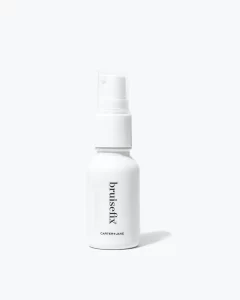Do you have bed bugs infesting your home? If so, you may be considering using bleach to get rid of them. But does it really work?
Does bleach kill bed bugs? What are the risks involved in killing bed bugs with bleach? Keep on reading to find out the answers!

How To Know If You’re Dealing With A Bed Bug Infestation
Identifying a bed bug infestation is key, as early detection can significantly simplify the process of eradicating these pests.
Bed bugs are small, oval, brownish insects that feed on the blood of animals or humans. Adult bed bugs have flat bodies about the size of an apple seed, but they swell and become reddish after feeding.
Physical Signs
Look for the following physical indicators:
-
Bite marks: These appear on your skin as red, itchy spots, often in a line or cluster and primarily found on exposed areas like the face, neck, arms, and hands while you sleep.
-
Excrement: Small, dark or rusty spots of bed bug excrement can be found on your sheets, mattress seams, or even walls.
-
eggshells or shed skins: Tiny, pale yellow skins that nymphs shed as they grow larger.
-
Live bugs: Although they’re elusive, you might find live bed bugs in the crevices of your mattress or box spring, behind headboards, and in furniture joints.
Sensory Clues
Detection Tactics
-
Visual inspection: Search for bed bugs at night when they are most active, using a flashlight.
-
Mattress check: Inspect the seams and folds of your mattress and box spring for live bed bugs or their excrement.
Environmental Evidence
It’s important to consider these signs and investigate further if you suspect an infestation.
Acting swiftly can help prevent the bed bugs from spreading to other areas of your home.

Why Do You Need To Sort Out A Bed Bug Problem Urgently?
When facing a bed bug infestation, it’s imperative to address the issue promptly due to several pressing reasons:
Health Concerns: Bed bugs feed on your blood, often resulting in itchy bites and discomfort. While they’re not known to transmit diseases, the bites can lead to secondary infections if scratched.
Fast Reproduction:
Addressing the problem quickly prevents the population from exploding and further complicating eradication efforts.
Psychological Impact:
-
Anxiety and Stress: Knowledge of an infestation can cause psychological distress.
-
Sleep Disturbance: Due to the nocturnal nature of bed bugs, it’s common for individuals to experience disrupted sleep patterns.
Financial Implications:
-
Early Intervention Costs Less: Treatment is less costly when the infestation is contained.
-
Property Damage: Severe infestations could lead to furniture and fabric damage, increasing expenses.
Social Stigma: Ignoring the issue can lead to a spread, and potentially, a social stigma if the infestation extends to neighbors or visitors become affected.

Does Bleach Kill Bed Bugs?
Bleach is recognized for its strong disinfectant properties, and yes, it is capable of killing bed bugs.
However, its effectiveness is contingent upon direct contact.
Direct Contact is Key:
-
When bleach comes into direct contact with bed bugs, it can be fatal.
-
The chemical components in bleach can deteriorate the insect’s exoskeleton.
-
This leads to dehydration and the eventual death of the bed bug.
Application Method:
-
To use bleach effectively, you must apply it directly to the insects.
-
Since bed bugs are adept at hiding, reaching them in their concealed spots proves challenging.
Limitations:
-
A full-blown infestation is unlikely to be eradicated with bleach alone.
-
Bleach is hazardous to humans and pets, particularly if misused or in enclosed areas.
-
Overuse may lead to damage or discoloration of surfaces where the bleach has been applied.
Safety Precautions:

How To Use Bleach To Kill Bed Bugs And Their Eggs
When using bleach to combat a bed bug infestation, take cautionary steps and follow this guide:
-
Preparation:
-
Cleaning:
-
Strip your bed of all linens and wash them in hot water.
-
Thoroughly vacuum the room, concentrating on mattresses, furniture crevices, and carpet edges.
-
Immediately dispose of the vacuum bag in a sealed plastic bag.
-
-
Application:
-
Treatment:
-
Lightly spray the bleach solution on surfaces where bed bugs are suspected.
-
Focus on cracks, bed frames, and potential hiding places but avoid over-wetting.
-
-
Safety Note:
-
Never mix bleach with other household cleaners, as this can produce dangerous gases.
-
Be aware that bleach may damage or discolor fabrics and materials.
-
-
Follow-Up:
-
Check the treated areas after a few hours for any signs of bed bugs or eggs.
-
Repeat the treatment if necessary, allowing time for areas to dry between applications.
-
Remember, bleach can be an effective method for killing bed bugs and their eggs on non-porous surfaces. Always test a small hidden area first to avoid damage.

How Long Does It Take Bleach to Kill Bed Bugs?
Bleach needs enough contact time with the bed bug in order to be effective in killing it.
Depending on the concentration of the bleach, it should take anywhere from five minutes up to twenty minutes for the bug to succumb to its effects.
The more concentrated the solution is, generally speaking, the shorter amount of contact time it will need with a bug before killing them.
However, care should always be taken when using bleach in any situation as it is corrosive and can cause permanent damage if misused or abused.
It’s generally recommended that a person using bleach for pest control takes their time and allows at least five full minutes of contact time between each spray application, while waiting thirty minutes between each set of applications for optimal results against bedbugs.
It’s important that all areas where bugs have been found be sprayed thoroughly with bleach as well as around baseboards and furniture legs or other areas where they could easily hide out during extermination attempts.
Careful attention should also be given when applying bleach near sealed wood surfaces as bleaching these materials could ruin them irreversibly.
So, caution must always be employed when dealing with this powerful household cleaner and pesticide agent.

Which Other Harsh Chemicals Are Effective For Killing Bed Bugs?
Aside from bleach, you have several options when it comes to harsh chemicals that are known to be effective in killing bed bugs.
Pyrethroids and pyrethrins are among the most common insecticides used for bed bug control.
Pyrethroids are synthetic chemical insecticides that act similar to pyrethrins—compounds naturally derived from chrysanthemum flowers.
Here’s a breakdown of chemicals you might consider:
-
Pyrethroids: Synthetic chemicals that disrupt the bed bugs’ nervous system.
-
Pyrethrins: Natural insecticides that also target the nervous system.
-
Neonicotinoids: These affect the bed bugs’ nicotinic acetylcholine receptors, leading to paralysis and death.
-
Desiccants: Substances like diatomaceous earth and silica gel that destroy the outer protective layer of bed bugs, causing dehydration.
When using these chemicals, it is crucial to adhere to safety guidelines and consider that bed bugs may develop resistance.

The Risks Of Using Bleach Method For Eliminating Bed Bugs From Your Home
While bleach effectively kills bed bugs upon direct contact, you should be aware of the several risks associated with its use.
Chemical Hazards are a primary concern; bleach is a corrosive substance that can cause irritation or burns to your skin and eyes.
When used in an enclosed space, the fumes from bleach can also be harmful if inhaled, potentially leading to respiratory issues.
Misapplication of bleach can result in damage to your belongings.
The bleach can damage fabrics, surfaces, furniture, bedding, and clothing. By causing discoloration and damage.
Here’s a quick breakdown of the risks:
-
Health Risks:
-
Material Damage:
-
Environmental Concerns:
Bed bugs can hide in tiny cracks, so it’s unlikely that bleach will work on all of them.
This may lead to a false sense of security and continued infestation.
Plus, the spread of bed bugs to new areas can occur when trying to eliminate them.
You may unintentionally disperse them throughout your home, worsening the situation.
Summary
Upon direct contact, bleach kills bed bugs as it is a potent chemical.
However, using it has risks: skin and eye irritation, respiratory problems, damage to furniture and fabrics, and pollution.
If you don’t apply treatment correctly, or get rid of all the bed bugs, they could come back.
So, make sure you consider other non-chemical methods for eradicating these pests.
While also consulting with pest control professionals before embarking on any chemical treatments.
#Bleach #Bed #Bugs #Bleach #Kill #Bed #Bugs #Expert #Opinions






.JPG)




















